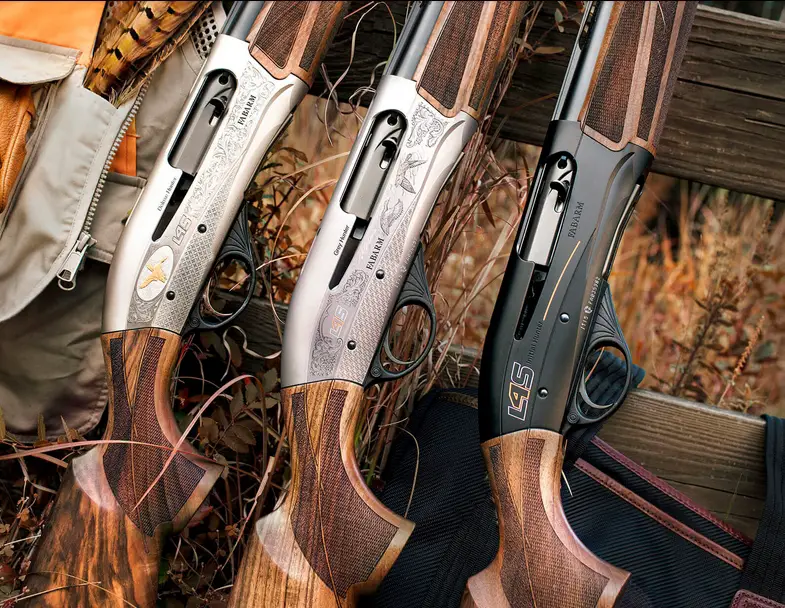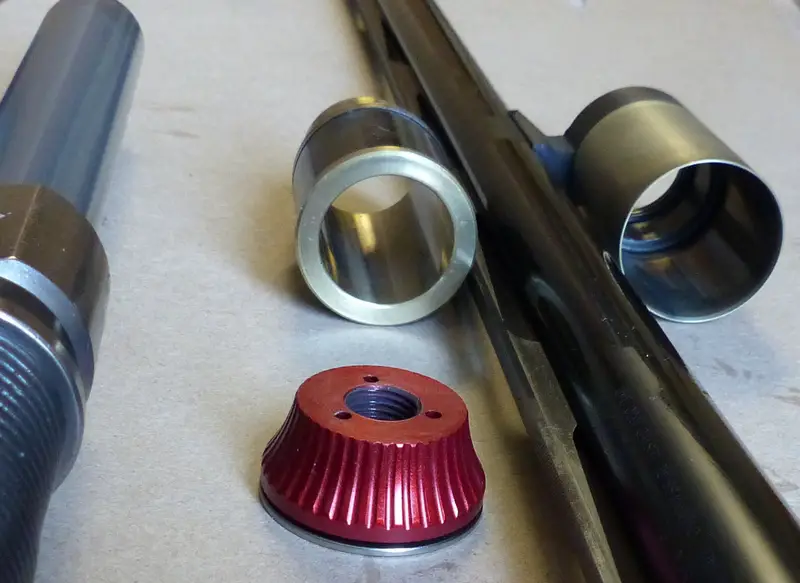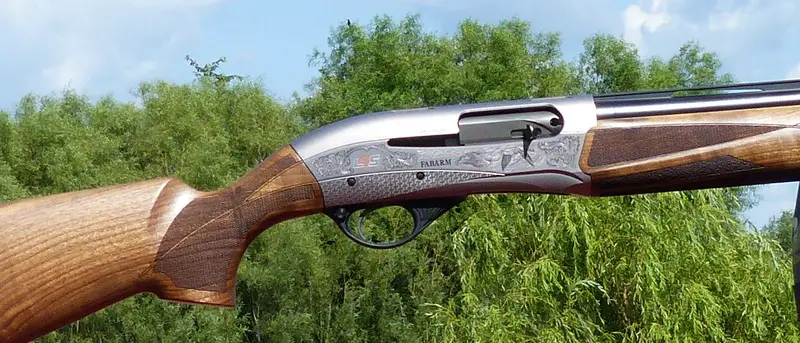Fabarm L4S Hunter: The Best All-Round Shotgun?

A very, very common question is, “What is the Best Shotgun, All-Around?” I've been asked this constantly, every week . . . sometimes every day. I'm reticent to answer, primarily because my version of “all around” use may not be your version of it. I'm also not really to assert that a shotgun is really good until I've tested multiple examples over multiple years. This is the third year I'll be carrying an L4S Grey Hunter for pheasant opener, so not it is appropriate to make some observations based on over three years of experience.
My personal version of “all around” is a shotgun I can use for dove, ducks, wild pheasants, clays, and have a really good time using it. The L4S Hunter qualifies. It isn't enough just to assert that something is good or bad, there have to be reasons: reasons that anyone can confirm for themselves. The shotgun also has to be a reasonable value. At about $1200 for a Fabarm Initial Hunter, it is a very long ways from the most expensive shotgun you can invest in. I'll start with quality.
BARREL QUALITY

One of the reasons that choke designations (IC, MOD, FULL, etc.) do not and cannot mean anything is the shotgun barrels themselves. With the usual shotgun barrels, and the barrel inside diameters vary from barrel to barrel by .005 - .010 inch, or more. Your “Mod” choke may be an IC in performance, or a cylinder. You won't know unless you measure your barrel, for there is no known constriction unless you know the bore diameter of the barrel itself and the exit diameter of the choke. Your factory choke tube often sucks because it has little to no actual constriction: no constriction, no choke.
Unlike most repeater shotgun barrels, the Fabarm's Tribore barrel is precision drilled, not struck. What this means to the consumer is that barrel dimensions are the same gun to gun: no more guessing about what a choke tube will throw, for the barrel's bores are not all over the place. The Fabarm Exis choke you have is going to throw the same pattern percentage as mine and, with the same ammo, will perform the same out of any other Fabarm Tri-Bore barrel.
The Tri-bore barrel does not have the velocity loss of over-bored guns. Over-sized factory bores, sometimes incorrectly called “Back-Bored” barrels, invariably show velocity loss compared to standard bores. Fabarm Tri-Bore barrels do not, clocking 30-35 fps faster with the same shells compared to a Browning Maxus and similar. The Tri-Bore barrels are proofed to a higher standard (1630 BAR) as well, higher than any other barrels. The barrel does not twist or rock: the barrel extension fits superbly into the receiver, giving a reassuringly solid feel.
CHOKE QUALITY
Fabarm chokes are all rated for steel. They also fit better and stay noticeably cleaner than most factory choke tubes and do not loosen.
Fabarm choke tubes are listed as 0/10, 1/10, and so forth up to 10/10. All 97mm Exis HP choke tubes are approved for use with steel shot shotshells. Fabarm choke tubes constrictions are in one-tenth of one millimeter, which is 0.0393701 inch. That's roughly .004 inch per stage of constriction. A 0/10 is cylinder (no constriction), a 1/10 is skeet, a 5/10 is about .020 inch (Modified) and a 9/10 is about .036 inch (Full). As with all choke tubes, the quality of the shell has a lot to do with pattern efficiency.
The earlier choke tubes on the market (Winchoke, a.k.a. Standard Invector) are extremely short and stubby. They are easy to spot, for the muzzle portion of the barrel is noticeably bulged. Mashing the muzzle over a mandrel, then threading it is a cheap way to produce them. Not only is it unsightly, but there isn't much area that has constriction to work with. Aggressive constrictions in very shot lengths put excessive stress on choke tubes, one of the reason that manufacturers have perpetuated the myth that “Modified” with a lead shotshell is equivalent to “Full” with a steel shot shotshell. It never was true, but lead is all the cheap, stubby choke tubes can handle.
Since 2002, Fabarm has used longer Exis tubes. The Fabarm Exis HP extended choke tubes are 97mm long: a bit over 3.8 inches long. The Fabarm standard flush tubes (“inner HP”) choke tubes are quite long themselves, meaning no unsightly barrel bulge and steel shot capability due to having the constriction of the tube over a long area: there is less stress on the tubes due to the gentler angle.

MACHINING QUALITY
Sharp edges, and rough / unpolished parts are not present in the L4S. That quality is not just the metal work, but extends to the clean checkering and satin oil finished walnut.
Barrel rings and gas piston housings are often a one piece unit, sometimes causing point of impact problems. With the L4S, the gas piston housing is not a cheaper one-piece unit. Instead, it is threaded, as is the matching barrel ring for a more concentric assembly.
WARRANTY / CUSTOMER SERVICE
The CG / Fabarm technician team is the best in the industry. You may never need them or the five-year warranty, but if by chance you do, you'll be delighted that you have them.
There are three trim levels: Initial Hunter (a.k.a. Black Hunter), Grey Hunter, and Deluxe Hunter. All have oil-finished walnut stocks, the function of the shotguns are identical. If you want more engraving or knock-out wood, those models are available for you.
RECOIL
It is hard to get away from the omnipresent “How's the recoil?” questions. As a gas-operated 6-3/4 lb. gun, the L4S is very comfortable for its weight class, but certainly if it was an 8 lb. gas-operated autoloader it would be softer-shooting. As is, its spritely weight shaves off half to three-quarters of a pound from many 3 inch twelve gauge autoloaders. You can put 1-3/4 oz. (or heavier) lead turkey loads through it if you wish, but for most hunting applications it is most at home with a stead diety of 1-1/4 to 1-3/8 oz. loads, exactly what is standard fare for wild pheasants and mallards. Naturally, recoil with target loads is minimal.
THE DESIGN
All gas-operated shotguns need at least some cleaning for best performance and longest life: all guns do, but many just don't get it. The cleaner the ammo, the less cleaning there is to do. With the L4S, the forearm is not a stressed part, and you can clean most of the action with no more disassembly than just removing the forearm. If you use Hornady One-Shot, you'll be surprised how quick and easy regular clean-up is.
There is no mainspring tube or spring in the butt-stock to clean or to cause you problems, the Fabarm Pulse Piston does not have any fragile springs that can break, and there is no additional valving or secondary gas bleeds to fuss with.
The L4S is also effortless to load and releasing the bolt does not require any button hunting: it is just a quick squeeze to the oval release button well-positioned on the left side of the receiver.
Back in 2015, I wrote, “The L4S has a lively, responsive feel that most 12 gauge autoloaders lack. Nothing rattles, no loose forearm syndrome, and it has a very solid, steady feel that the pogo-stick and “springy stock thing” autoloaders sadly lack. Based on trigger quality, barrel quality, choke quality, generously chrome plated action parts, and flawless assembly, the L4S is the most satisfying 12 gauge autoloader I've shot in decades. Add in its dashing good looks and the surprisingly low price, the L4S Initial Hunter easily gets my vote for Shotgun of the Year.”
So now, three years later, pheasant season is just a matter of weeks away. You can believe I'll be carrying an L4S with a 26 inch barrel on opening day this year, just like last year, and the year before that. The gun will be helped along by Buddy, the Wonderdog, who is currently enjoying his 14th year, with a 5/10 Exis HP extended choke screwed in and 1-1/4 oz. of lead #5 shot.

You can certainly spend more on a shotgun, a whole lot more, but the best all-around shotgun on the market today for my uses is the Fabarm L4S.
Copyright 2018 by Randy Wakeman. All Rights Reserved.












